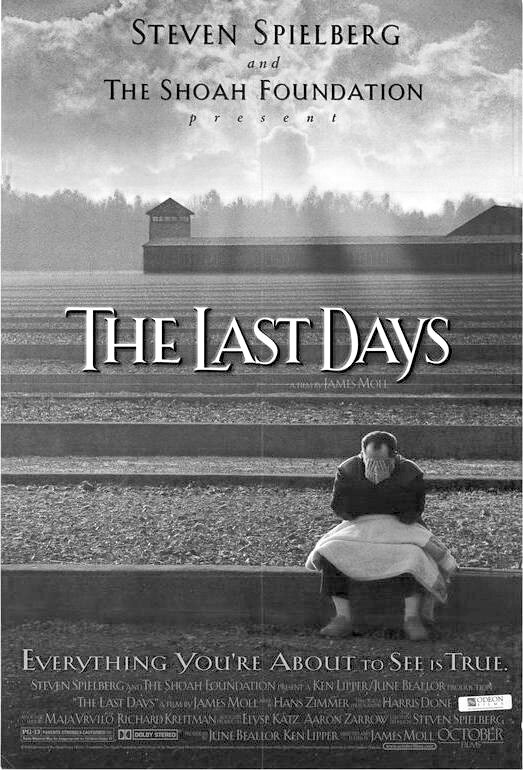Spielberg’s Oscar-winning Holocaust documentary to be shown April 7
“You stepped over bodies. You didn’t pay attention. It didn’t mean anything. I never knew anyone’s name. I didn’t want to know.”
These chilling words were spoken by Holocaust survivor Bill Basch in Steven Spielberg’s 1998 award-winning documentary, “The Last Days,” which will be screened on April 7 at 10 a.m. at the Alliance’s Dwares Jewish Community Center in Providence. The program is sponsored by the Sandra Bornstein Holocaust Education Center and the Rhode Island Jewish Historical Association. Light refreshments will be served.
The film, which won the Oscar for Best Documentary (Feature) in 1999, focuses on the meteoric decimation of the Hungarian Jewish population in 1944, as seen through the eyes of survivors.
In the final year of the war, the Nazis knew they were running out of time. During the summer months of 1944, the Allies launched their D-Day attack on the beaches of Normandy, and successfully liberated both Italy and France. The prime minister of Hungary, Miklos Kallay, once a close ally of Nazi Germany, then began peace negotiations with the United States and Britain, hoping to distance himself and his country from the Nazi regime.
In retaliation, Germany occupied Hungary, deposed Kallay, and installed a puppet government led by the Fascist political party Arrow Cross. The Fascists quickly began aggressively pursuing the “Final Solution” for Hungarian Jews, then the largest remaining Jewish population in Europe.
The new leadership was popular with much of the Hungarian population, which feared Soviet occupation and enthusiastically supported the destruction of the country’s Jews.
In March, only one month after the occupation, Jews across Hungary were put into hastily constructed ghettos. On an accelerated timeline, deportations began in May 1944. In less than two months, 440,000 Jews were taken to Auschwitz, where most were murdered. The remaining 70,000 Jews in Budapest were tortured by the Arrow Cross inside the ghetto and subsequently forced on a death march to the Austrian border.
On the eve of the war, there were 825,000 Jews in Hungary. At liberation, only 255,000 remained.
The film highlights the strength of five survivors as they revisit old homes, ghettos and concentration camps, often with their children and grandchildren. Their perseverance is severely tested during the visits, particularly when returning to their cities of origin, where they find former neighbors living in their homes and synagogues that have been converted into concert halls and wiped of all Jewish history. The survivors move almost like ghosts through places which have worked hard to forget them.
This erasure has continued into the modern day. Hungary, like many former Nazi collaborators, has been increasingly unwilling to admit its role in Jewish oppression and the Holocaust. Historians and politicians alike engage in clear revisionism around Hungary’s role in the Holocaust. Since 2010, the country has been led by far-right leader Viktor Orban, who is well-known for his antisemitic remarks and policies.
Hungary’s relationship to its Jewish community, both to survivors and those murdered during the Holocaust, adds dimension to “The Last Days” and makes the documentary a thought-provoking and compelling watch.
After the screening, Rabbi Michael Cahana, a former associate rabbi and director of education at Temple Beth-El, in Providence, will speak via Zoom. Cahana is the son of Alice Lok Cahana, one of the survivors featured in “The Last Days.” He will lead a discussion and answer audience questions, as well as share more about his mother’s artistic career after her liberation.
For more information and to RSVP, please call 401-453-7860 or email info@hercri.org
GIOVANNA WISEMAN is director of programs and community outreach at the Sandra Bornstein Holocaust Education Center, in Providence.








